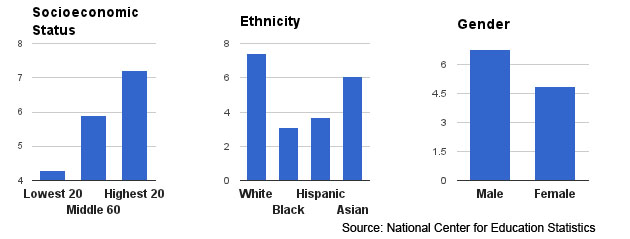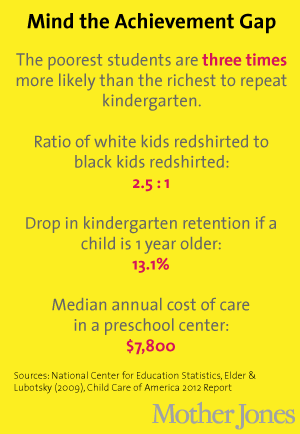
Class: <a href="http://www.shutterstock.com/pic-138148427/stock-photo-group-of-elementary-pupils-in-classroom.html?src=84odXRnubloTBBnVtYV25w-1-0">Monkey Business Images</a>/Shutterstock; Bearded man: <a href="http://www.shutterstock.com/pic-74123914/stock-photo-portrait-of-a-man.html?src=DBESdohvYXf-sQb1EyFiww-1-12">siamionau pavel</a>/Shutterstock. Photoillustration by Matt Connolly.
In this era of hypercompetitive parenting, more families are choosing to delay their children’s entry into kindergarten, under the impression that the kids will have an academic and social advantage. In fact, a 2008 study by Harvard researchers claims that since the late 1960s, the number of six-year-olds in first grade has dropped by 9 percent because they are increasingly likely to be enrolled in kindergarten.
No one disputes the immediate results of “redshirting,” a phrase borrowed from the sports world. Six-year-olds categorically test better than five-year-olds in kindergarten, and they enjoy greater social and physical maturity that helps them make friends and win at tag. But there’s a growing debate about the effectiveness of redshirting in the long term—not only for the kids held back, but for their peers, as well.
Some context: Like private school, redshirting is most prevalent among white, Asian, and relatively wealthy families. Here’s 2010 data from the National Center for Education Statistics on the percentages of kids delaying kindergarten:

There are several factors at play here, including the traditional wisdom, backed up by research, that shows little boys to be particularly fidgety in kindergarten. That said, the most striking disparity is also the most worrying. For families earning the least in this country, redshirting is cost-prohibitive (PDF). As higher-income families delay their kids’ kindergarten entry, children from lower-income families end up “competing” against older and more-prepared classmates—at a crucial time for learning and development.

Given the increasingly dramatic size of the existing achievement gap—one exacerbated by few affordable pre-K options—some worry that as teachers make kindergarten more challenging to engage the older students, low-income kids will fall even further behind (PDF). Poor students already repeat the grade three times more frequently than wealthy kids.
What’s more, a growing body of research suggests that redshirted kids might not enjoy benefits over the long run, anyway. A 2007 paper for the National Bureau of Economic Research argues that “contrary to much academic and popular discussion of school entry age—being old relative to one’s peers is not beneficial.” (Also, unpublished research from 2012 found that the advantages of redshirting “fade out and appear to reverse by eighth grade.”)
Until more-conclusive research emerges, well-meaning parents are likely to continue redshirting their children. And depending on the individual child, that could be the right choice. But as Harvard researcher David Deming says, it’s crucial that parents “make a decision with the whole life course in mind.”












